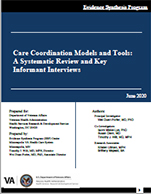
|
Prepared by: Recommended citation: |
Download PDF: Complete Report, Executive Summary, Report, Appendices
Complexity of health care services and care fragmentation contribute to adverse health outcomes and poor patient experiences of care. Over the past 20 years, there has been substantial interest in care coordination interventions, particularly to reduce utilization of acute care services. Care coordination models usually involve systematic strategies that aim to improve continuity and bridge transitions of care. Often, this takes the form of care or case management, in which a designated person or team helps patients manage their medical care and navigate interactions with the health care system(s). It remains unclear whether care coordination interventions can sufficiently address gaps in care and improve patient outcomes.
The VA Care Coordination and Integrated Case Management (CC&ICM) initiative was launched in 2016, as a collaboration between the VA Offices of Care Management and Social Work, and Nursing Services. The main goals of this initiative are to standardize and integrate care coordination services across all VA facilities and points of care for Veterans. To assist the CC&ICM initiative, the VA ESP was asked to review evidence on implementation and outcomes of various care coordination models.
We summarize evidence from eligible systematic reviews (SR) on key characteristics and effectiveness of care coordination interventions for diverse adult populations at high risk for adverse outcomes. Additionally, we present results from primary research studies of effective interventions (ie, those able to reduce hospitalizations and/or emergency department [ED] visits) regarding tools and approaches to assess patient trust and care team integration, and to improve communication between patients and providers. To better understand which results may be most applicable to VA, we also provide information about the settings in which effective care coordination models were implemented. Finally, we present results from key informant interviews to address remaining gaps in the published literature, particularly with regard to tools and approaches used by various interventions.
KQ1 What are the key characteristics of care coordination models (of varying types) that aim to reduce hospitalization or ED visits?
KQ2 What is the effect of implementing these care coordination models on hospitalizations, ED visits, and patient experience (eg, Consumer Assessment of Healthcare Providers and Systems)?
KQ3 What are the characteristics of settings in which effective models have been implemented?
Among effective models, which approaches/tools have been used to:a) Measure patient trust or working alliance?
b) Measure team integration?
c) Improve communication between patients and providers?
To address these KQ, we first focused on identifying eligible SR on care
Care Coordination Models and Tools: A Systematic Review and Key Informant Interviews (Management eBrief)
Duan-Porter W, Ullman K, Majeski B, Miake-Lye I, Diem S, and Wilt TJ. Care Coordination Models and Tools - Systematic Review and Key Informant Interviews. Journal of General Internal Medicine. Published online October 26, 2021. DOI: https://doi.org/10.1007/s11606-021-07158-w.